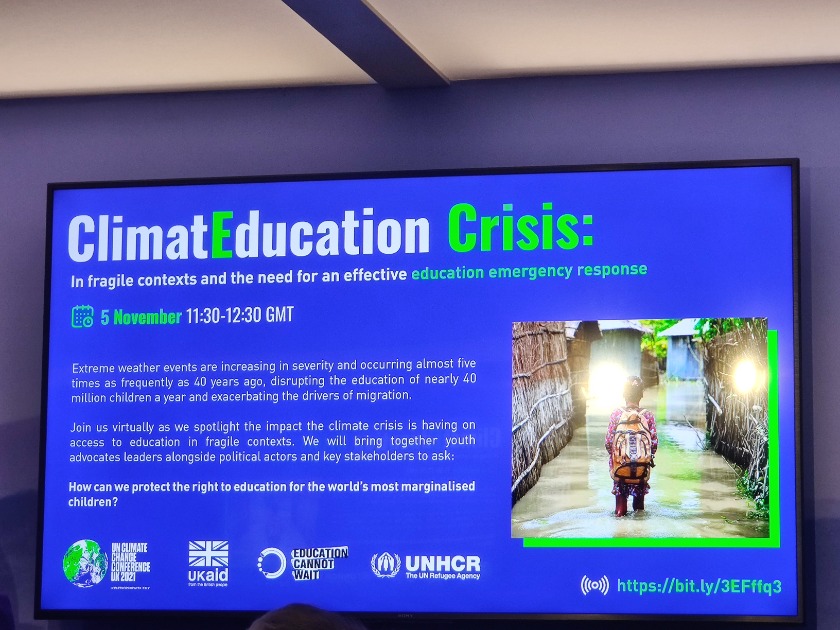This session, hosted by the UK Government, Education Cannot Wait and UNHCR, was filled with inspiring discussions, thought-provoking videos and moving stories from those on the front line of climate change – predominantly within Africa. The focus was fragile contexts, the need for an effective education emergency response where the most marginalised children’s education is disrupted and the devastating effects this has on them, their families and their future opportunities.
A Youth Advocate from Transform Education in association with Plan UK and UN Girls Education, fighting for climate justice and gender equality, spoke about how she and the organisations she represents champion the importance of 12 years of education for girls globally. Climate change is a major disruptor of education, and girls are disproportionately affected by natural disasters, including flooding and drought. For example, 200 million of the most vulnerable women and girls are at the front line of climate change and the focus on SDG 4 – quality education – is vital. Providing girls with quality education can make a huge difference, as it allows them to build resilience and to participate in decision making and action. There is a UK policy and new additional finances towards this, including £4 billion raised with the Kenya joint conference in London in July.
There are two ambitious new global targets: 20 million girls reading by age 10 and 40 million girls in primary school by 2026. This is critical in response to the climate crisis, and effective emergency response is vital. Education Cannot Wait advocates for the importance of keeping children in learning environments, and they hope that the international community will support them with multi-year funding. On that note, an additional £85,000 was pledged during the session to provide interventions for displaced children.
“We must act now.” – Director Yasmine Sherif, Education Cannot Wait
Yet still, “we are not doing enough”. Education has the power to tackle the climate crisis. However, the impact of the climate crisis on education, particularly for indigenous peoples and children from marginalised backgrounds is stark. Working together shouldn’t be underestimated to secure the future of young people all around the world.
The Norway Minister explained that in order to reach SDG 4, we need to ensure children affected by climate change can continue their education, in addition to ensuring we prevent and prepare for emergencies. Education enables young people to become part of the climate solution and during a crisis situation, school represents a sense of normality. Furthermore, there must be a special focus on helping girls to stay in school. It is imperative that education and climate change must be higher on the agenda.
“40 million children experience education disruption every year. The climate crisis is an education crisis. Education is a key part of the solution.” – Graham Lang, CEO Education Cannot Wait
The Education Minister from Sierra Leone explained that the reality is that climate related disruption to education happens every day. Children are unable to attend school as roofs are blown off or teachers are responding to flooding in the community. It’s not just the big events – such as mudslides and large-scale flooding – it is the regular ones that are having a constant negative impact. When schools are closed, it is the girls who suffer the most; the Ebola epidemic was an example of this with increased pregnancies. Sierra Leone has since developed and implemented policies for those most at risk and vulnerable, including the hard to reach areas. At the heart of it is climate education. He finished by explaining that finance must be expanded and mobilised, keeping money in education regardless of other crises, including the current Covid pandemic. It is not about the future, it is about now and all children matter.
The video, presented by a UK UNHCR representative, showed how crises are traumatic for young people; they directly impact children’s ability to learn. It illustrated a need for further investment, particularly for increased involvement in clean energy plans like solar and reforestation projects.
Gillian Colwell – US Aid representative, suggested that while education has traditionally focused on numeracy and literacy, it is important to ensure climate change is added to the education and curriculum agenda today, not tomorrow.
Key questions asked towards the end of the panel discussion were:
Q: How best to minimise the disruption to education from climate impact?
A: Unfortunately, there is still a lack of urgency. There are 20 million newly displaced people annually. Education is central to the life of children and communities, and how disruption is handled is fundamental. Using technology to reduce that gap is paramount, in addition to not purely focusing on primary education, as children need more than this. It is also vital to minimise the time all children are out of learning as continuity is key in displacement contexts. It goes far beyond just education – enabling teaching and learning materials, as well as providing clean water, basic food and sanitation. A coordinated holistic response is needed in conjunction with being unapologetically impatient.
Q: What government policies could make education more resilient?
A: Education is Sierra Leone’s finance flagship. They have expanded the country’s budget during Covid, and continue to be unapologetic for asking for more finances. It is important to focus on children with disabilities and those in hard to reach areas – people, materials and technology have to reach those. People in poverty must receive support to get out of poverty with education and cash transfer.
“3/4 billion (750,000,000) people worldwide lack access to education.”
The session finished with discussions on the importance of collaboration, particularly between donors and funders, and creating a shared vision to invest in mitigation measures. The Sierra Leone Minister for Education says, “We need to be ambitious and flexible”. We need to go beyond our own egos; a collaborative whole society approach is necessary. In a nutshell, the ‘money pot’ simply needs to get bigger. A staggering 48% of refugee children are not in school. Covid showed the negative effects when education is disrupted; we need to work collectively and demonstrate international solidarity and take real, true action.
Lucy Meredith and The Team





